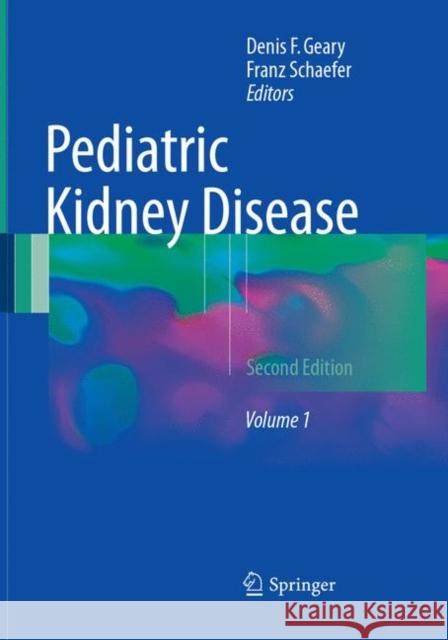Pediatric Kidney Disease » książka



Pediatric Kidney Disease
ISBN-13: 9783662571019 / Angielski / Miękka / 2018 / 2005 str.
Pediatric Kidney Disease
ISBN-13: 9783662571019 / Angielski / Miękka / 2018 / 2005 str.
(netto: 594,23 VAT: 5%)
Najniższa cena z 30 dni: 597,58
ok. 16-18 dni roboczych.
Darmowa dostawa!
"This is certainly a superb resource for postgraduate trainees and other nephrology physicians. It has excellent, well designed, and very clear tabular depictions of the salient features. The figures certainly are helpful ... . Most of the chapters are about the perfect length and provide appropriate information about the subject. I commend the contributors and the editors for their thoroughness and clarity of writing, augmented by current references." (Aftab Chishti, Doody's Book Reviews, June, 2017)
From the Content: Imaging and Radiological Interventions in the Pediatric Urinary Tract.- Laboratory Evaluation at Different Ages.- Tools for Renal Tissue Analysis.- Proteomics in the Evaluation of Renal Disorders.- Clinical Informatics in Pediatric Renal Disease.- Antenatal Assessment of Kidney Structure and Function.- Genetics; Basic Concepts and Testing.- Structural and Functional Development of the Kidney.- Disorders of Kidney Formation.- Nephronophthisis and Medullary Cystic Kidney Disease.- Polycystic Kidney Disease; ADPKD and ARPKD.- Hematuria and Proteinuria.- Nephritic Syndrome .- Hereditary Nephrotic Syndrome.- Alport Syndrome and Thin Basement Membrane Nephropathy.- Steroid Sensitive Nephrotic Syndrome.- Steroid Resistant Nephrotic Syndrome.- Membranoproliferative Glomerulonephritis.- IgA Nephropathy.- Membranous Nephropathy.- Post Infectious Glomerulonephritis.- Rapidly Progressive Glomerulonephritis.- Lupus Nephritis..- Henoch Schonlein Nephritis.- Renal Vasculitis in Children..- Hemolytic Uremic Syndrome.- Disordered Hemostasis and Renal Disorders.- Differential Diagnosis and Management of Fluid, Electrolytes, and Acid-Base Disorders. Fanconi Syndrome.- Bartter Gitelman, and Related Syndromes..- Disorders of Magnesium Metabolism.- Renal Tubular Acidosis.- Diabetes Insipidus.- Interstitial Nephritis.- Hyperoxaluria in Children.- Diagnosis and Management of Urinary Tract Infections.- Vesicoureteral Reflux.- Obstructive Genitourinary Disorders.- Renal Calculi.- Voiding Disorders.- Acute Kidney Injury – Prevention and Diagnosis.- Management of Acute Kidney Injury.- Renal, electrolyte, and acid-base disorders in neonates.- Epidemiology, Etiology, and Consequences of Childhood Hypertension.- Investigation of Hypertension in Childhood.- Treatment of Childhood Hypertension.- Progression of Chronic Kidney Disease and Renoprotective Therapy in Children.- Growth and Puberty in Chronic Kidney disease.- Neurodevelopmental Issues in Chronic Kidney Disease.- Nutritional Challenges in Pediatric chronic Kidney Disease.- Anemia in Chronic Renal Disease.- Disorders of Bone Mineral Metabolism in Chronic Kidney Disease.- Cardiovascular Disease in Pediatric Chronic Kidney Disease.- Psychosocial and Ethical Issues in Children with Chronic Kidney Disease.- Dialysis Modality Choice and Initiation – Global Preferences.- Peritoneal Dialysis Access.- Hemodialysis Vascular Access.- Pediatric Hemodialysis; Prescription, Efficacy and Complications.- Demographics and Outcomes of Children on Renal Replacement Therapy.- Immunosuppression in Pediatric Kidney Transplantation.- Acute allograft dysfunction.- Chronic Renal Transplant Dysfunction.- Prevention and Treatment of Infectious Complications in Pediatric Renal Allograft Recipients.- Malignancy after Pediatric Renal Transplantation.- Drug Use and Dosage in Renal Disease.- Causes and Manifestation of Nephrotoxicity.- Complementary and Alternative Treatments for Renal Diseases.- Nephrotoxicity of Herbal Remedies.
Professor Franz Schaefer, MD, leads the Pediatric Nephrology Division at the Center for Pediatrics and Adolescent Medicine at Heidelberg University Hospital. Franz has a 25-year track record in clinical and experimental research in paediatric kidney diseases. He founded and coordinates several international clinical research consortia such as the ESCAPE Network (50 active European paediatric nephrology centres), the International Pediatric Peritoneal Dialysis Network (IPPN, 80 active centres globally) and the PodoNet Consortium for Clinical, Genetic and Experimental Research into Hereditary Diseases of the Podocyte (65 active centres globally). The Division runs a molecular nephrology lab fully equipped for gene diagnostic services, animal and cell culture research, RNA, protein and histochemistry studies. He is coordinator of EURenOmics, one of RD-Connect’s key scientific partner projects.
Doctor Denis Geary, MBBCh, received his Paediatric Nephrology training at the University of Florida in Gainesville, The Hospital for Sick Children at Great Ormond St, and Guy’s Hospital, London, UK.
Dr. Geary joined the Division of Nephrology at The Hospital for Sick Children as Staff Nephrologist and Director of Hemodialysis. He was appointed Chief of the Division of Nephrology in 1997, and was reappointed in 2002 for a second five-year term. He is currently Chairman of the Patient Care Committee, The Hospital for Sick Children, and past-President of the Canadian Association of Paediatric Nephrologists.
The new edition of this valuable clinical resource offers a state of the art, comprehensive review on every clinical condition encountered in pediatric nephrology. International experts present the latest knowledge on epidemiology, diagnosis, management, and prognosis in one concise, clinically focused text, in which care has been taken to couple just the right amount of "need-to-know" basic science with practical clinical guidance that will enable the reader to make efficient, informed decisions.
The topics covered in Pediatric Kidney Disease, Second Edition include: disorders of renal development, glomerular disorders, the kidney and systemic disease, renal tubular disorders, tubulointerstitial disease, urinary tract disorders, acute kidney injury, hypertension, chronic and end-stage renal disease, and renal replacement therapy. The disease-specific chapters offer detailed coverage of diagnostic work-up, laboratory evaluation, and management of disorders and complications. Information is also provided on important related issues, including the genetic origins of diseases, the potential value of proteomics in the evaluation of renal disorders, and a section completely dedicated to complement-related renal disorders
Pediatric Kidney Disease, Second Edition ensures that the practitioner is able to source and apply information with remarkable ease. It is also an ideal resource for those preparing for pediatric nephrology board examinations.
1997-2026 DolnySlask.com Agencja Internetowa
KrainaKsiazek.PL - Księgarnia Internetowa









